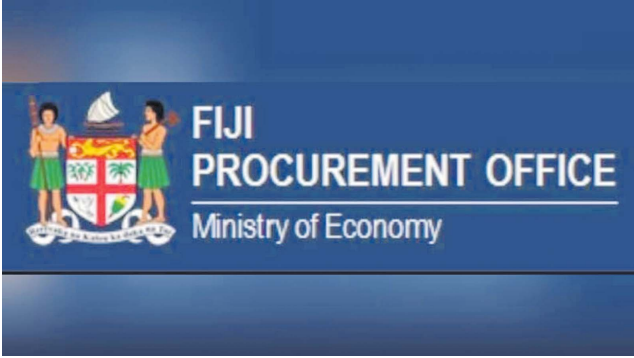GOVERNMENT will soon implement a new set of procurement regulations and guidelines that are designed to promote open competition, ethical practices, and value for money, with a strong emphasis on sustainable development outcomes and support for local businesses. Information made public by the Fiji Procurement Office (FPO) outlines what changes are coming and why.
There will be an expanded scope, meaning the procurement regulations now apply not only to ministries and departments, but also to other budget sector agencies and off-budget State entities, ensuring a more unified procurement framework. There will be more procurement methods which have been expanded from four to eleven, introducing options such as electronic reverse auctions and community participation to allow greater flexibility. Stronger oversight and record-keeping is also coming in with the Fiji Procurement Office’s role to be enhanced beyond administrative functions, focusing on active monitoring. Additionally, record-keeping requirements have been extended to seven years.
There will be new procurement principles to address risk mitigation, sustainable procurement, and maximising value for money while ensuring open, fair, inclusive, and equitable competition.
There is also an updated threshold values with new approval thresholds better reflecting current economic conditions, ensuring efficient and effective procurement. Stricter emergency purchase criteria will now be limited to unforeseen extreme urgency events, with a clear transition plan to open and competitive methods. A dedicated Debarment Committee will have the authority to suspend suppliers for up to five years for unethical practices such as bid collusion and contract misconduct. To this end a public register will list debarred entities. Under the new regulations, there will be a right to challenge and stand-still period (10 days) will be effected before finalising contracts to allow bidders to challenge decisions, ensuring a fairer procurement process. In addition, there will be a transparent disposal of government assets.
How suppliers will be affected
The Government of Fiji will buy goods and services from businesses with a focus on value and sustainability under the new guidelines. The Fiji Procurement Office states Government wants the best value for its money, not just the cheapest option. The revised regulations go beyond just the initial cost, considering long-term benefits such as maintenance, operational efficiency, and environmental impact.
“As a supplier, this means showcasing the total life cycle value of your offerings, including any environmental or social benefits associated with your products or services,” states the FPO.
There will be wider opportunities and fair competition under the new regulations for supplies.
The revised regulations aim to create a more inclusive and competitive environment for suppliers. New methods such as electronic reverse auctions and community participation programs open up more avenues for participation.
“Additionally, the regulations encourage open competition by requiring justification for selecting any method other than open tenders. This creates a level playing field while promoting the inclusion of disadvantaged groups and small and medium enterprises (SMEs).”
On transparency and accountability, supplies contract award information will be published in a public register allowing suppliers to understand past decisions and identify potential future opportunities.
“Additionally, suppliers are granted a standstill period to challenge any proposed award decision deemed unfair.”
The revised regulations will get rid of the maximum 30-day advertisements and replace this with a minimum of 10 days.
Suppliers will potentially have more time to respond to complex tenders allowing for better preparation and more competitive bids.
“Electronic submissions and signatures are now explicitly recognised subject to approval by the Fiji Procurement Office.”
Suppliers will be subjected to a revised bond rate where a market-based bond rate, commensurate with project risk, will replace the flat 10 per cent rate.
There will be a review and appeal process for suppliers where they can appeal decisions to the permanent secretary responsible for finance who may appoint a complaints committee to assess the appeal.
A debarment process will also come into effect which includes the process for excluding or debarring suppliers from procurement processes.
“Government through the debarment committee may exclude a supplier or contractor from a specific procurement process or future procurement processes if they or their agent offer a bribe to influence procurement proceedings, have conflicts of interest, or engage in coercion or threats to influence participation in a procurement process or the execution of a contract.”
Permanent secretaries and senior ministry officials
The new procurement regulations will bring new grounds for waiver of tender procedures. The minister (responsible for Finance) also retains authority to approve exemptions under certain circumstances that includes urgent infrastructure development and services and legal services. Some waiver conditions will be moved to the Tender Board for approval.
“Previously, the Hon. Minister (responsible for Finance) held the primary authority to approve most waiver requests.
“However, under the revised regulations, decision-making for certain waiver grounds has been transferred to the board.
“This includes areas like defence procurements, overseas missions, and agency-to-agency procurements,” states the FPO.
To ensure informed decision-making by the board, all waiver requests requiring their approval will now necessitate comprehensive reports prepared by the requesting ministries, conducted with due diligence.



